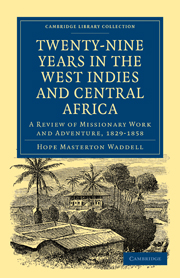 Twenty-Nine Years in the West Indies and Central Africa
Twenty-Nine Years in the West Indies and Central Africa Book contents
- Frontmatter
- Preface
- Contents
- CHAPTER I 1829
- CHAPTER II 1830, 1831
- CHAPTER III 1832
- CHAPTER IV 1832, 1833
- CHAPTER V 1834, 1835
- CHAPTER VI 1836, 1837
- CHAPTER VII 1837, 1838
- CHAPTER VIII 1838-1840
- CHAPTER IX 1841-1844
- CHAPTER X 1841-1845
- CHAPTER XI 1845
- CHAPTER XII 1846
- CHAPTER XIII 1846
- CHAPTER XIV 1846
- CHAPTER XV 1846, 1847
- CHAPTER XVI 1847
- CHAPTER XVII 1847
- CHAPTER XVIII 1847
- CHAPTER XIX 1847, 1848
- CHAPTER XX 1848, 1849
- CHAPTER XXI 1850
- CHAPTER XXII 1850
- CHAPTER XXIII 1850
- CHAPTER XXIV 1851
- CHAPTER XXV 1851
- CHAPTER XXVI 1852
- CHAPTER XXVII 1852
- CHAPTER XXVIII 1853, 1854
- CHAPTER XXIX 1855
- CHAPTER XXX 1856
- CHAPTER XXXI 1857
- CHAPTER XXXII 1858
- CHAPTER XXXIII 1858
- APPENDIX
- Plate section
CHAPTER XVI - 1847
Published online by Cambridge University Press: 07 September 2011
- Frontmatter
- Preface
- Contents
- CHAPTER I 1829
- CHAPTER II 1830, 1831
- CHAPTER III 1832
- CHAPTER IV 1832, 1833
- CHAPTER V 1834, 1835
- CHAPTER VI 1836, 1837
- CHAPTER VII 1837, 1838
- CHAPTER VIII 1838-1840
- CHAPTER IX 1841-1844
- CHAPTER X 1841-1845
- CHAPTER XI 1845
- CHAPTER XII 1846
- CHAPTER XIII 1846
- CHAPTER XIV 1846
- CHAPTER XV 1846, 1847
- CHAPTER XVI 1847
- CHAPTER XVII 1847
- CHAPTER XVIII 1847
- CHAPTER XIX 1847, 1848
- CHAPTER XX 1848, 1849
- CHAPTER XXI 1850
- CHAPTER XXII 1850
- CHAPTER XXIII 1850
- CHAPTER XXIV 1851
- CHAPTER XXV 1851
- CHAPTER XXVI 1852
- CHAPTER XXVII 1852
- CHAPTER XXVIII 1853, 1854
- CHAPTER XXIX 1855
- CHAPTER XXX 1856
- CHAPTER XXXI 1857
- CHAPTER XXXII 1858
- CHAPTER XXXIII 1858
- APPENDIX
- Plate section
Summary
Calabaros and Calapongas were names given to the tribes in the Bight of Biafra, by the Portuguese, the first discoverers of that coast. The former has come to be applied to the Efik people especially, though it is not a word of their language, and they did not occupy their present seats when Europeans first visited that country. Originally they dwelt in Ibibio, or the Egbo Shary country, between the Niger and Calabar rivers, bordering on the great Ibo tribes; but, defeated in a civil war early in the last century, they abandoned their old, and founded new settlements on the east bank of the latter river. A portion of them in a few years descended the stream, to get near the European ships engaged in the slave trade, and founded Ikoritungko, called from its position Creek Town, by the English traders, which, owing to the cargoes of all ships passing through the hands of the native merchants there established, increased and prospered.
Wealth and pride brought strife among the towns-people, and the weaker party being expelled, descended the river a few miles further, and settled Obutong, now Old Town, in a commanding situation, which cut off their victorious rivals from the shipping on that branch of the river. The latter, in self defence, sent a colony and founded a new town still lower down than Obutong, and called it Aqua-akpa, now Duke Town. Its advantageous situation for trade, having the ships at anchor in front, and free access to all parts of the country, drew many families to reside there, and it soon eclipsed both the others.
- Type
- Chapter
- Information
- Twenty-Nine Years in the West Indies and Central AfricaA Review of Missionary Work and Adventure, 1829–1858, pp. 309 - 321Publisher: Cambridge University PressPrint publication year: 2010First published in: 1863
